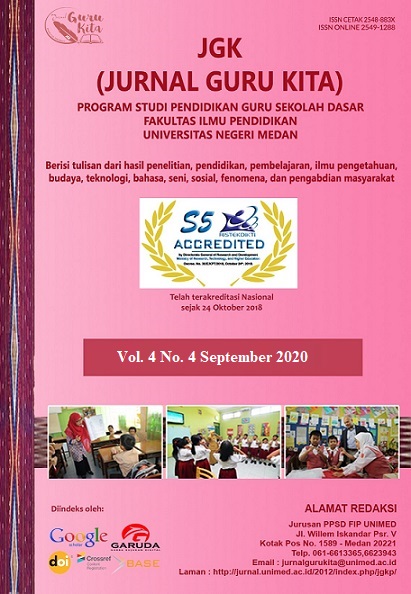PENGARUH COVID-19 TERHADAP KEBIASAAN KARYAWAN DAN CARA MENGATASINYA DI DKI JAKARTA
DOI:
https://doi.org/10.24114/jgk.v5i4.26683Keywords:
Covid-19, kebiasaan karyawan, kesehatan mentalAbstract
Abstract: The Influence of Covid-19 on Employee Habits and How to Overcome Them in DKI Jakarta. The Covid-19 pandemic has an impact not only in terms of existing public health, but the spread of this virus has caused changes in employee habits due to policies implemented by the government to handle Covid-19. One of them is from employees who previously worked in offices, now have to work from home. This study aims to identify the effect of Covid-19 on the mental health of employees and how to overcome it. Literature study is the method used for this research, namely through data collection from journals, books and others. From the research, it was found that Covid-19 had a very big influence on employee habits. Keywords: Covid-19, employee habits, mental health Abstrak: Pengaruh Covid-19 Terhadap Kebiasaan Karyawan dan Cara Mengatasinya di DKI Jakarta. Pandemi Covid-19 memberikan dampak tidak hanya dalam hal kesehatan masyarakat yang ada, namun penyebaran virus ini menyebabkan perubahan kebiasaan karyawan akibat kebijakan yang dilakukan pemerintah untuk penanganan Covid-19. Salah satunya dari karyawan yang sebelumnya bekerja di kantor, kini harus bekerja dari rumah. Penelitian ini bertujuan untuk mengidentifikasi pengaruh Covid-19 terhadap kesehatan mental karyawan dan cara mengatasinya. Studi literatur merupakan metode yang digunakan untuk penelitian ini yaitu melalui pengumpulan data dari jurnal, buku dan lain-lain. Dari penelitian diperoleh hasil bahwa Covid-19 memberikan pengaruh yang sangat besar terhadap kebiasaan karyawan. Kata Kunci: Covid-19, kebiasaan karyawan, kesehatan mentalReferences
Dana Riksa Buana. 2020. Analisis Perilaku Masyarakat Indonesia dalam Menghadapi Pandemi Virus Corona (Covid-19) dan Kiat Menjaga Kesejahteraan Jiwa. 7(3): 217-226. Diakses pada 20 Mei 2021, dari http://journal.uinjkt.ac.id/index.php/salam/article/view/15082
Ginting, Hendy. 2020. Perubahan Perilaku Sebagai Respon Terhadap Wadah Covid-19. Diakses pada 21 Juni 2021, dari https://himpsi.or.id/blog/materi-edukasi-covid-19-5/post/perubahan-perilaku-sebagai-respon-terhadap-wabah-covid-19-127
Karunia, Ade Miranti. 2020. Kemenaker: Dampak Corona Dahsyat, 13,9 Persen Perusahaan Kurangi Karyawan. Diakses pada 02 Juli 2021, dari https://money.kompas.com/read/2020/07/01/214000326/kemenaker--dampak-corona-dahsyat-13-9-persen-perusahaan-kurangi-karyawan
Kemenkeu RI. 2020. Mengelola Stres Pegawai di Tengah Pandemi Covid-19. Diakses pada 19 Juni 2021, dari https://www.djkn.kemenkeu.go.id/artikel/baca/13486/Mengelola-Stres-Pegawai-di-Tengah-Pandemi-Covid-19.html
LIPI. 2020. Survei Dampak Darurat Virus Corona terhadap Tenaga Kerja Indonesia. Diakses pada 25 Juni 2021, dari http://lipi.go.id/siaranpress/survei-dampak-darurat-virus-corona-terhadap--tenaga-kerja%20indonesia/22030
Pandamsari, Aulia Putri dan Leoni Alvionita. 2020. Survey: Pandemi Bikin 51% Masyarakat Depresi, 60% Karyawan Cemas. Diakses pada 7 Juli 2021, dari https://lokadata.id/artikel/survei-pandemi-bikin-51-masyarakat-depresi-60-karyawan-cemas
Pennington, Tess. 2020. Panduan Kesiapsiagaan Hadapi Virus Corona. Jakarta. PT Elex Media Komputindo.
Downloads
Published
How to Cite
Issue
Section
License
Authors published with the JGK (Jurnal Guru Kita) agree to the following terms:
- Authors retain copyright and grant the journal the right of first publication with the work simultaneously licensed under a Creative Commons Attribution License (CC BY-SA 4.0) that allows others to share the work with an acknowledgment of the work's authorship and initial publication in this journal.
- Authors are able to enter into separate, additional contractual arrangements for the non-exclusive distribution of the journal's published version of the work (e.g., post it to an institutional repository or publish it in a book), with an acknowledgment of its initial publication in this journal.
- Authors are permitted and encouraged to post their work online (e.g., in institutional repositories or on their website) prior to and during the submission process, as it can lead to productive exchanges, as well as earlier and greater citation of published work. (See The Effect of Open Access)




























